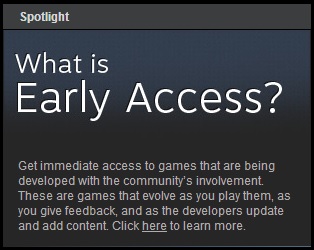I have made it a habit of mine never to buy games on Steam with “Early Access” in the description on Steam (unless it happens to arrive in the form of bundles, which I accept as a natural casualty of this writing hobby). There are several reasons for this:
1. I never, EVER, want to provide a developer feedback on their game in any way, shape, or form. I am of the opinion that artistic intent matters, and kowtowing to your audience for a particular reaction often won’t improve the game in question. Can you imagine, for example, Dark Souls on Early Access? What would people ask Hidetaka Miyazaki to change? Probably a whole lot of things, from the spacing of bonfires to the punishing difficulty of some areas of the game (provided you just smack your head against that brick wall without learning anything, of course). As such, I prefer not to provide that feedback, precisely because a director’s opinion matters – the audience, on the other hand, will arise naturally if it resonates. Any lovers of novelty in the video game space should think similarly, as injecting our own ideas into the process may not prove the wisest idea.
Or, to put it simply: Early Access turns game design into Marketing 101 and Focus Group Testing for Video Gamer Developers, rather than creating the game they want to actually create.

2. I don’t see the appeal in playing half-finished games. I get it – people like to get in on the ground floor for some of these games, whether out of a self-righteous need to play “the next big thing” or just to play stuff before everyone else, but does that mean the actual game you’re playing exists as little more than a free beta test? Businesses are savvy in the way they portray a game release. “Early Access” is a euphemism for “QA Tester”, and don’t you dare forget it. You paid for the privilege too, so congratulations! At least some companies provide the game for free and leave it in Alpha, Closed Beta, or Open Beta. They make no qualms or false promises that you participated in a testing of a game’s quality, servers, bugs, or whatever. Early Access, on the other hand, demands you pay them for a game that may, or may not, work close to intended form. I would rather wait, thanks!
In sum, I don’t pay for unfinished stuff unless the author happens to be dead, and so far not many video game developers are dead.

3. There’s also the problem of being a critic and reviewing a half-finished piece of work you paid to play with your own money. I do not believe in reviews for games that don’t yet exist in their final form – hence, you will not often see a review of World of WarCraft or Hearthstone, just because such a review would make no sense in the long run. While it would take a simple snapshot of a particular period in a game’s life, it would not really represent the game at all in the next few years. If I reviewed World of WarCraft right now, for example, I probably would not take the next tier of patch 6.2 content into account, and that might change my decision radically on what’s a flaw and what is not. I can provide opinions, and updates, but to slap a score on a game like that seems foolhardy in the long run.
What goes for persistent online games also holds true for Early Access, at least in my mind. The game might radically shift in a few weeks or months from “awful pile of awfulness” to “wonderful pile of wonderfulness”, and then my opinion makes no sense in context of this new transformation. Why expend that kind of effort to present an opinion that will not provide an accurate, useful description of a game?
Maybe other people love seeing the meat grinder and the processing factory, but these do not remain my primary interest. I want to see the games as they were intended to be, by some people with a keen enough sense to get it right without outside feedback hounding at their heels every step of the way. In my mind, the appropriate time to play a video game does not lie in its unfinished, nascent stages, but when it is, in some sense, complete. Otherwise, how could I ever accurately judge it, or understand it, as the work of a creative team without shortchanging their vision, their ideas, and their thoughts?
There is a definite time for everything, and many times I find the mystery of game development more intriging than the individual nuts and bolts. Were some of the elements intentional? Was everything so clearly designed, or did some one come up with something in the last second that fixed the whole experience for everyone? Perhaps we will never know these stories, or how things came into being (heck, you gotta wonder about Hideo Kojima’s thought processes sometimes, or even his proclivity never to take anything at face value), but I find that much more engaging than knowing everything.
So yes, this sounds pretentious and weird, but there’s really a time for everything, and Early Access certainly does not fit what I want out of a video game, at all. I am content to wait, knowing that this delayed gratification will become infinitely more satisfying than simply playing something due to endless marketing hype or pushing myself into a long line at PAX just to get a chance to play it and feel minor disappointment. I’ve done this enough that it inevitably affects the end experience, and never for the better.
God often wants us to wait, and impatience gets the better of us. Who knows His plans better than He? Definitely not us. It is a matter of trust and relational understanding, not of getting what I want immediately. Simple consumption will eventually consume you, and inevitably delay God’s work in you. So it is in video games, so it is in life.
11 He has made everything appropriate in its time. He has also set eternity in their heart, [c]yet so that man will not find out the work which God has done from the beginning even to the end.
Ecclesiastes 3:11
